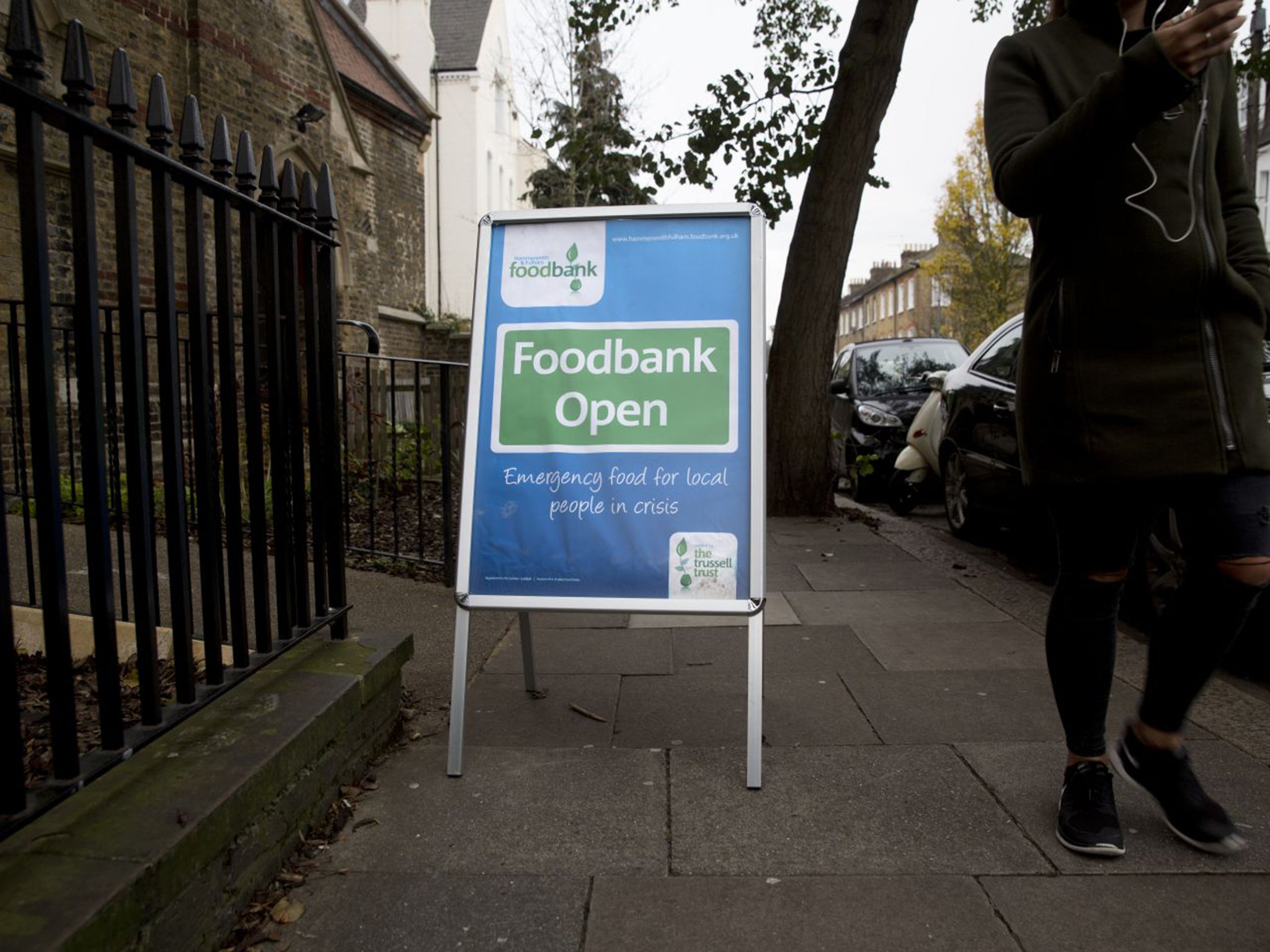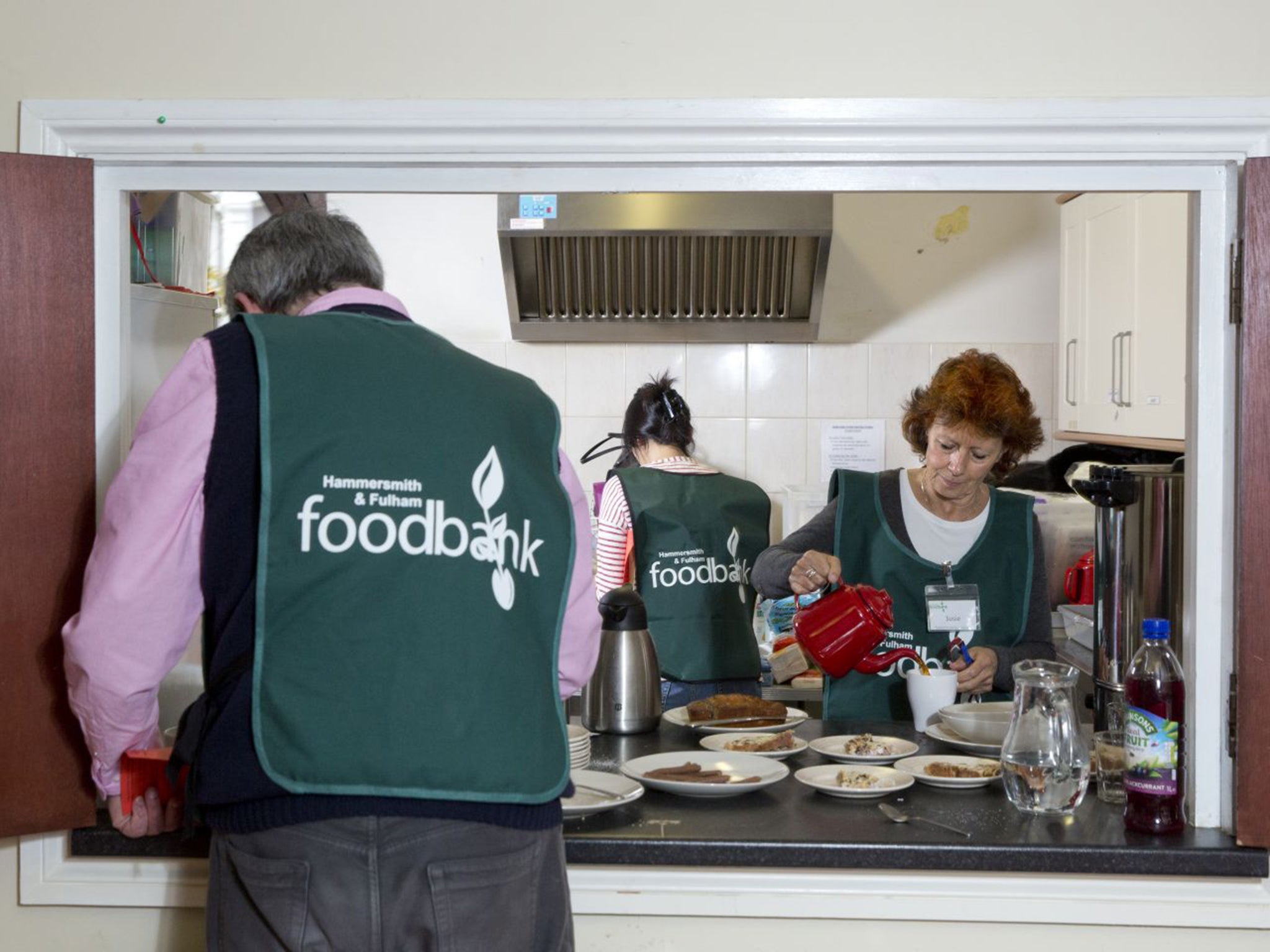Food banks in the UK: Volunteers face a growing battle as benefits crisis bites
Food banks barely existed when David Cameron came to power in 2010, but now there are 425 across the country

Your support helps us to tell the story
From reproductive rights to climate change to Big Tech, The Independent is on the ground when the story is developing. Whether it's investigating the financials of Elon Musk's pro-Trump PAC or producing our latest documentary, 'The A Word', which shines a light on the American women fighting for reproductive rights, we know how important it is to parse out the facts from the messaging.
At such a critical moment in US history, we need reporters on the ground. Your donation allows us to keep sending journalists to speak to both sides of the story.
The Independent is trusted by Americans across the entire political spectrum. And unlike many other quality news outlets, we choose not to lock Americans out of our reporting and analysis with paywalls. We believe quality journalism should be available to everyone, paid for by those who can afford it.
Your support makes all the difference.There’s a silver Porsche parked outside a church in Fulham, next to a food bank delivery van. Financiers and footballers live in the gorgeous red-brick Victorian houses here that sell for £3m.
Only a few miles away, there are rich men in the House of Lords who say that real poverty no longer exists in Britain. But inside the church there is a woman who has been starving herself in order to have food for her children. “Anybody would. Wouldn’t you?”
Ceceline has tears in her eyes. The number of men and women like her coming in desperation to food banks like this is still rising, despite what some people think. This is the month when demand soars by 50 per cent.
“Oh God, Christmas is here. The adverts on the TV and the radio, going over and over. I just want it to pass,” she says. “This is the worst time of year, the pressure on a mother.”
She was already struggling on £70 a week, having to buy everything a woman and three growing girls of 10, 12 and 13 need to eat, to wear, to keep them warm, to get to places, including school.

Then she says her benefits were stopped without warning or explanation, because (as it turned out) she had made a mistake on a claim form. A couple of numbers in the wrong place. “I realised what I had done and corrected it. I even wrote, ‘Sorry.’ They didn’t write or call me for the right information. They just stopped everything. Four weeks with no food and no money.”
The family live in an emergency council flat with fungus growing up the walls, infecting their possessions and getting into their lungs.
“Yes, it’s mouldy. It’s damp. But it’s my little safe haven for me and my children. Two rooms, bathroom, toilet. I’m safe indoors. There ain’t no one gonna come and rape me or trouble my children. I have to give thanks for that.”
I don’t know what to say, thinking about what that implies about her life so far. A food bank worker reaches out to offer a comforting touch on the shoulder but she shrugs it off.
“Uh-uh,” she says. “There have been things that have happened in the last three years that have reduced me to a piece of rubble.”
You would not guess it to look at her. Ceceline is dressed in boots, jeans and a sweater with a beige body warmer, a stud in her nose and a beanie hat on her head, and comes across as a strong woman. She hates being told that. “I don’t feel strong.”
“Hunger is hidden in this country,” says Molly Hodson of the Trussell Trust, which helps volunteers and a handful of professionals to run the food bank here at Christ Church, and many more besides. “Cold weather means people struggle more. You have to find extra to heat your home. It almost seems unbelievable that any family in the UK can go hungry on Christmas Day, but that is the reality.”
Food banks barely existed when David Cameron came to power in 2010, but now there are 425 across the country and the number is still growing. They are not going away – we have just become used to them, immune to what was considered shocking only a year ago.
Yes, the tax credit cuts have been cancelled and disaster averted for many families, but others are still going under. Trussell Trust gave away 506,000 emergency food packs (containing enough for a family for three days) between April and September this year, an increase of 14,000 on the same period in the previous year despite the economic recovery. Cuts are still kicking in.
“I was embarrassed to come here. It felt awful, but is pride going to fill your belly? No,” says Ceceline, who explains she was a chef until earlier this year. She hurt her back and had to stop for a while. “They said they would call me back when they were busy again. Well, I’m still waiting.”
She is dreading Christmas Day. “I cannot give my kids what I cannot get. I’m not going to go to the shop and start thieving.”
A volunteer overhears this and goes to the store, where they keep presents labelled for children of different ages, already wrapped. She brings three over to the table and suddenly Ceceline can’t keep it all in. “I’m sorry, I wasn’t expecting that. It’s so kind. You won’t believe what this means. Sorry ….”
Let’s be honest: we have all heard stories like this before. But let me say that while I can take what Ceceline says only at face value, I do know she is a real person alive today, struggling to survive in a city that dares to call itself the capital of the world when this is going on, and much worse besides. It’s not as if we don’t know about it.
A year ago, a high-powered coalition of experts, activists, charities, church leaders and MPs from all parties published a major report called Feeding Britain. It said people were suffering because of wages that were too low to live on and benefits that did not get paid.
The report demanded reform of the welfare system, an end to food waste and for local and national government to help food banks become places where people in need could get expert help and advice, there and then. This would help stop the “evil” of hunger stalking the land.
The Prime Minister promised to take it seriously, but nothing much happened. A year later, here we are again.
“We can’t just talk about this any more. We need action,” says Molly Hodson. “There has to be a big, broad, societal decision to do something.”

A cynic would say the moment has passed. We’re dropping bombs on Syria at half a million pounds a payload. Politics has moved on. Last week, Lord Prior stood up in the Lords and said there was a “paradox” between the rise in obesity and the increasing use of food banks.
The minister of NHS productivity knows that some are even opening up in hospitals, but insisted there was no link between this and breakdowns in the ever-changing benefit system. That flies in the face of the evidence from the Trussell Trust, which logs every referral and says 43 per cent are made because of a change or delay in benefit payments.
Then there is Lord Sugar, said to be worth a billion pounds, who says nobody is really poor in Britain any more, because they all have televisions and mobile phones. “Compare that to 60 years ago. If you really want to know what poor is like, go and live where I lived in Hackney, where you didn’t have enough money for the electric, didn’t have a shilling for the meter,” he said.
What does Molly Hodson from Trussell say about that? “That was true then, but it is still true today. Liza, the food bank manager in Hackney, east London, has people coming in who have to make hard choices about whether to feed themselves and their children or heat their house. Sometimes they can’t do either.”
The first Trussell Trust food bank opened in Salisbury in 2000 when a returned overseas aid worker was asked by a local woman where she could get food for her children. Four million people now volunteer or donate food every year.
Daphine Aikens set up the food bank at Christ Church, her place of worship, in 2010 and was shocked by what she saw. “A woman came in here and you could still see eight finger marks on her neck and the thumb marks around the back. We see people who are really suffering, who have been raped or trafficked. It is hidden, but not for us.”
What can they do? “Be warm and welcoming as much as you can, but also ask if they have been to the police, what has already been organised, see who we can put them in touch with. And of course, give them food.”
Increasingly, places such as this are employing counsellors, financial advisers, advocates to take up people’s causes with the authorities, even setting up pilot fuel banks with energy company npower to help with prepayment meter top-ups. In other words, doing what the Feeding Britain report suggested, only without the Government’s help. They can’t afford to wait.
Are they trying to fill the gaps left by the broken, overstretched welfare state? Isn’t it all a bit Dickensian? “We never want to be part of the welfare state or a replacement for it,” says Molly Hodson. “What we are doing is enabling the voluntary sector to be more co-ordinated. We are not reinventing the wheel. There are specialists who already exist, and if we can bring their services directly to people at the moment they need them most, we can stop a lot of crises happening.”
Most of the people who come to this food bank have walked here from the estates beyond the posh streets, but not everybody. “We have had clients coming to us from these £3m houses who have lost their jobs and are so fully extended with mortgages and school fees and memberships that losing a pay cheque for more than a couple of months leaves them with nothing to live on,” says Daphine Aikens.
“We had a chap come in who needed nappies and baked beans. He lived locally; he was a former banker. Last time I saw him he was flying off to Zurich for a job interview.
“I assume he got it because we never saw him again.”
You don’t have to spend long in a food bank to realise how quickly things can go wrong. “We don’t acknowledge as a society how close we all are to breaking point,” says Molly Hodson. “There is a saying that you are only two pay cheques from a real crisis, and if any of us lost our income suddenly, we would struggle.”
Lord Sugar should pop down to Christ Church in his Rolls and see what can happen when someone really does get fired. Lord Prior ought to come and look Ceceline in the eye, see how eloquent and determined she is, even now. She would tell him what she tells me as she leaves, on her way out past the Porsche: “Just be thankful you have a job, because this could easily be you.”
Join our commenting forum
Join thought-provoking conversations, follow other Independent readers and see their replies
Comments